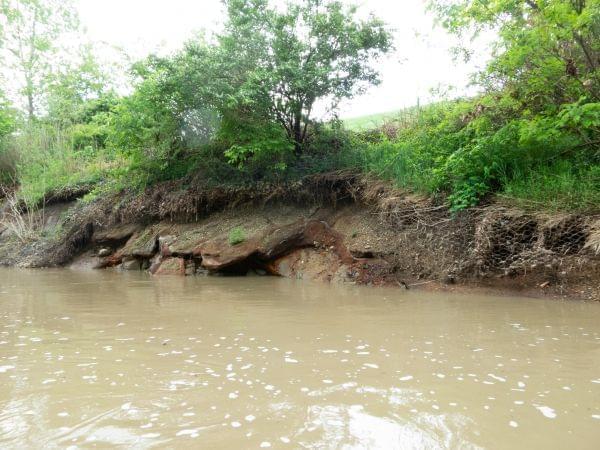New Law Aims To Prevent Toxic Coal Ash Contamination Of Illinois Waterways

Erosion of the Middle Fork riverbank is undermining the Dynegy coal ash ponds at the Vermilion Power Station. Seepage from the coal ash can been seen entering the river. Jack Brighton/Illinois Public Media
Illinois environmental agencies will create new rules for the storage and disposal of toxic coal ash from power plants, under a new law signed today by Governor J.B. Pritzker.
The Coal Ash Pollution Prevention Act lays out guidelines for these new rules.
Democratic State Senator Scott Bennett of Champaign, chief sponsor of the bill in the Senate, said the goal is to help Illinois be proactive rather than reactive in addressing potential contamination of waterways with coal ash, a toxic byproduct generated by coal-fired power plants.
Bennett said incidents in other states have shown cleaning up contaminated waterways can be costly; and sometimes full remediation is not possible.
“(We want) to make sure that we don’t have an environmental disaster,” Bennett said. “And in the event that some kind of problem does come up, it’s not taxpayers but it’s ultimately the owner of the coal ash pit which has to pay for it.”
The new law takes effect immediately and requires power plant owners to pay fees for storing coal ash.
Bennett said those funds will help the Illinois EPA hire additional staff to implement the new regulations and conduct state inspections of the coal ash disposal process.
Andrew Rehn with the Prairie Rivers Network said the financial component is important for ensuring the funding is available in the event of a spill.
“If something goes wrong and the company goes bankrupt, disappears, they’ll have put up real money already that we could access to help clean up the coal ash ponds,” Rehn said.
Passage of the new law was spurred by concerns over coal ash stored at a shuttered power plant on the banks of the Middle Fork of the Vermilion River near Danville.
Rehn said public input during the rule-making process will be crucial to ensuring that coal ash is kept out of river and groundwater.
Bennett said he’s working now on a trailer bill that will clarify exactly who is responsible for conducting cleanup in the event of a coal ash spill – and how those involved in cleanup will be protected from exposure to toxic chemicals.
He said he hopes to introduce that bill during the October veto session or shortly thereafter.
Links
- Coal Ash Bill Passes House, Heads To Governor
- Senate Bill Proposes Statewide Solution To Coal Ash Problem
- Bipartisan Illinois House Resolution Calls for Coal Ash Task Force
- Illinois EPA Seeks Public Input On Dynegy Plan To Stabilize the Middle Fork Near Coal Ash Ponds
- Officials Call For A Public Hearing As Coal Ash Continues To Pollute The Middle Fork
- Loose Regulations Allow Coal Ash To Threaten River
- Prairie Rivers Network Suing Dynegy To Clean Coal Ash Pits Along Vermilion River
- Pollution Panel Weighing New Rules For Coal Ash

